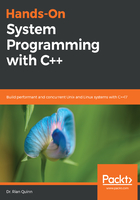
上QQ阅读APP看书,第一时间看更新
Libraries
C++ not only defines the basic environment and language syntax—it also provides a set of libraries that may be leveraged by a programmer to perform system programming. These include the following:
- Console input/output libraries: These include the iostream, iomanip, and string libraries, which provide the ability to work with strings, format them, and output them (or grab input from the user). We will discuss most of these libraries in Chapter 6, Learning to Program Console Input/Output.
- Memory management libraries: These include the memory library, which contains memory management utilities that help to prevent dangling pointers. They will be discussed in Chapter 7, A Comprehensive Look at Memory Management.
- File input/output libraries: These include the fstream and filesystem (new to C++17) libraries, which will be discussed in Chapter 8, Learning to Program File Input/Output.
- Time libraries: These include the chrono library, which will be discussed in Chapter 11, Time Interfaces in Unix.
- Threading libraries: These include the thread, mutex, and conditional_variable libraries, which will be discussed in Chapter 12, Learn to Program POSIX and C++ Threads.
- Error-handling libraries: These include the exception support libraries, which will be discussed in Chapter 13, Error - Handling with Exceptions